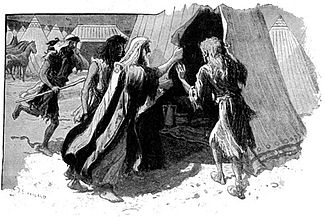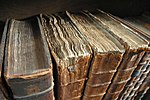Tazria
In common years (for example, 2025, 2026, and 2028), Parashat Tazria is combined with the next parashah, Metzora, to help achieve the number of weekly readings needed.
[14] When a streaky green or red eruptive affection occurred in wool, linen, or animal skin, it was to be shown to the priest, who was to examine it to determine whether it was clean or unclean.
In Deuteronomy 24:8–9, Moses warned the Israelites in the case of skin disease (צָּרַעַת, tzara'at) diligently to observe all that the priests would teach them, remembering what God did to Miriam.
In 2 Kings 7:3–20, part of the haftarah for Parashat Metzora, the story is told of four "leprous men" (m'tzora'im, מְצֹרָעִים) at the gate during the Arameans' siege of Samaria.
The parashah has parallels or is discussed in these early nonrabbinic sources:[20] Philo taught that the skin disease in Leviticus 13 signified voluntary depravity.
[23] Reading Leviticus 12:2, “If a woman conceives,” Rabbi Levi said three things: It is only natural that if a person has given into another's keeping an ounce of silver in private, and the latter returns a pound of gold in public, the former will surely be grateful to the latter; and so is it with God.
Those words imply that even if a woman bore something like "conceived seed" (in a fluid state), she was nonetheless unclean by reason of childbirth.
[30] The disciples of Rabbi Simeon ben Yoḥai asked him why Leviticus 12:6–8 ordained that after childbirth a woman had to bring a sacrifice.
[33] Rabbi Zera taught that Ecclesiastes 5:11 provided a Scriptural proof for this when it says, "Sweet is the sleep of a serving man, whether he eat little or much."
Rabbi Simeon ben Azzai thus taught that Scripture uses the same expression each time to teach that it is the same whether people offered much or little, so long as they directed their hearts to Heaven.
But Rabbi Simeon quoted the instructions of Leviticus 12:8, "a young pigeon or a turtledove for a sin-offering", to teach that Scripture accepted both equally.
[42] Reading Leviticus 13:1, a Midrash taught that in 18 verses, Scripture places Moses and Aaron (the instruments of Israel's deliverance) on an equal footing (reporting that God spoke to both of them alike),[43] and thus there are 18 benedictions in the Amidah.
[45] A Midrash compared the discussion of skin diseases beginning at Leviticus 13:2 to the case of a noble lady who, upon entering the king's palace, was terrified by the whips that she saw hanging about.
The Midrash cited as proofs: (1) for idol-worship, the experience of the Israelites who said of the Golden Calf, "This is your god, O Israel", in Exodus 32:4 and then were smitten with leprosy, as reported in Exodus 32:25, where "Moses saw that the people had broken out (parua, פָרֻעַ)", indicating that leprosy had "broken out" (parah) among them; (2) for unchastity, from the experience of the daughters of Zion of whom Isaiah 3:16 says, "the daughters of Zion are haughty, and walk with stretched-forth necks and ogling eyes", and then Isaiah 3:17 says, "Therefore will the Lord smite with a scab the crown of the head of the daughters of Zion"; (3) for bloodshed, from the experience of Joab, of whom 2 Samuel 3:29 says, "Let it fall upon the head of Joab, and upon all his father's house; and let there not fail from the house of Joab one that hath an issue, or that is a leper," (4) for the profanation of the Divine Name, from the experience of Gehazi, of whom 2 Kings 5:20 says, "But Gehazi, the servant of Elisha the man of God, said: ‘Behold, my master has spared this Naaman the Aramean, in not receiving at his hands that which he brought; as the Lord lives, I will surely run after him, and take of him somewhat (me'umah, מְאוּמָה)," and "somewhat" (me'umah, מְאוּמָה) means "of the blemish" (mum, מוּם) that Naaman had, and thus Gehazi was smitten with leprosy, as 2 Kings 5:20 reports Elisha said to Gehazi, "The leprosy therefore of Naaman shall cleave to you"; (5) for blaspheming the Divine Name, from the experience of Goliath, of whom 1 Samuel 17:43 says, "And the Philistine cursed David by his God", and the 1 Samuel 17:46 says, "This day will the Lord deliver (sagar, סַגֶּרְ) you", and the term "deliver" (sagar, סַגֶּרְ) is used here in the same sense as Leviticus 13:5 uses it with regard to leprosy, when it is says, "And the priest shall shut him up (sagar)"; (6) for robbing the public, from the experience of Shebna, who derived illicit personal benefit from property of the Sanctuary, and of whom Isaiah|22:17 says, "the Lord .
[50] Similarly, Rabbi Judah the Levite, son of Rabbi Shalom, inferred that skin disease comes because of eleven sins: (1) for cursing the Divine Name, (2) for immorality, (3) for bloodshed, (4) for ascribing to another a fault that is not in him, (5) for haughtiness, (6) for encroaching upon other people's domains, (7) for a lying tongue, (8) for theft, (9) for swearing falsely, (10) for profanation of the name of Heaven, and (11) for idolatry.
The term "ordinances" (מִשְׁפָּטִים, mishpatim), taught the Sifra, refers to rules that even had they not been written in the Torah, it would have been entirely logical to write them, like laws pertaining to theft, sexual immorality, idolatry, blasphemy and murder.
A person affected by skin disease (מְּצֹרָע, metzora) is accounted as dead, for Numbers 12:10–12 says, "And Aaron looked upon Miriam, and behold, she was leprous (מְצֹרָעַת, metzora'at).
)[58] Rava recounted a Baraita that taught that the rule of Leviticus 13:45 regarding one with skin disease, "the hair of his head shall be loose", also applied to a High Priest.
[66] The parashah is discussed in these medieval Jewish sources:[67] Maimonides taught that the laws of impurity serve many uses: (1) They keep Jews at a distance from dirty and filthy objects.
Goodfriend reported that "the view that women—via their normal, recurring bodily functions—generate a pollution antagonistic to holiness served as a justification for women's distance from the sacred throughout Jewish history."
Goodfriend speculated that the priesthood excluded women because of "fear that the sudden onset of menstruation would result in the clash of impurity and holiness, with presumed dire consequences".
[70] Ephraim Speiser wrote that the word “Torah” (תּוֹרָה) is based on a verbal stem signifying “to teach, guide,” and the like, and the derived noun can carry a variety of meanings, including in Leviticus 13:59, 14:2, 54, and 57, specific rituals for what is sometimes called leprosy.
[71] Maimonides cited verses in this parashah for 3 positive and 1 negative commandments:[72] According to Sefer ha-Chinuch, there are 5 positive and 2 negative commandments in the parashah:[77] Some Jews refer to the laws of bird offerings in Leviticus 12:8 and the laws of the menstrual cycle as they study the end of chapter 3 of Pirkei Avot on a Sabbath between Passover and Rosh Hashanah.
A man from Baal-shalishah brought the prophet Elisha bread of the First Fruits—20 loaves of barley—and fresh grain in his sack to give to the people to eat.
[51] And fundamentally, both the parashah and the haftarah view skin disease as related to the Divine sphere and an occasion for interaction with God.
"[105] The Babylonian Talmud, however, taught that Naaman was merely a resident alien who observed the seven Noahide commandments (including the prohibition on idolatry).
[114] The king arose in the night, and told his servants that he suspected that the Arameans had hidden in the field, thinking that when the Samaritans came out, they would be able to get into the city.
[117] So the people went out and looted the Arameans' camp, so that the price of fine flour and two measures of barley each dropped to a shekel, as God had said it would.
[118] And the king appointed the captain on whom he leaned to take charge of the gate, and the people trampled him and killed him before he could taste of the flour, just as the man of God Elisha had said.
[121] Rabbi Joḥanan taught that the four leprous men at the gate in 2 Kings 7:3 were none other than Elisha's former servant Gehazi (whom the Midrash, above, cited as having been stricken with leprosy for profanation of the Divine Name) and his three sons.























